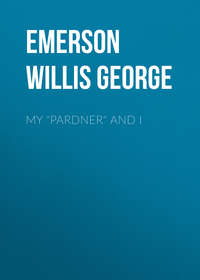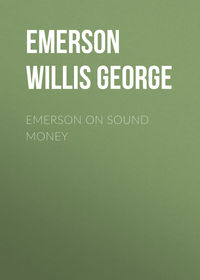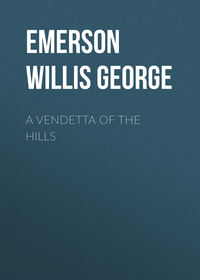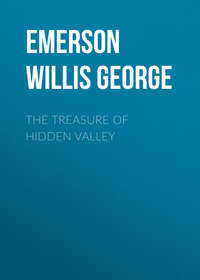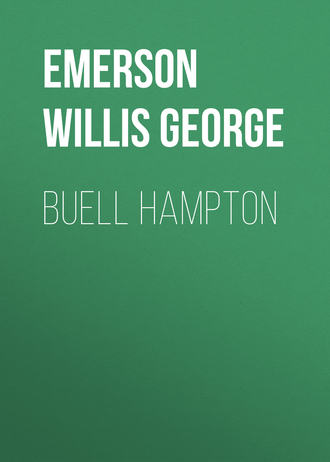 полная версия
полная версияBuell Hampton
“Oh, very well,” replied Hugh, and with this arrangement he bade her good day.
When Hugh arrived at Captain Osborn’s that evening, he found the captain with his little son, Harry, on a shady grass-plot, which was screened from the street by twining honeysuckles.
“Hello, Hugh, my boy,” cried the captain, as he saw him coming through the gate, “come out here, and make yourself at home.”
“How do, Untile Hoo,” said Harry, as he advanced to shake hands with his father’s friend, “don’t ‘ou fink dis is a nice p’ace?” asked the little fellow, waving his small hand around the enclosed nook.
“Indeed, it is, Harry,” replied Hugh, “one of the most delightful places I ever saw.”
“Dis is where papa an’ I turns a tourtin’,” said he, innocently. “We’s failin’ more an’ more in love wiv each uv’er ever’ time we turns out here, is n’t we, papa?”
“That’s what we are, you little rogue,” laughed the captain, beaming tenderly at the child.
Soon after, Mrs. Osborn drove up, and they all went in to dinner. As the meal progressed, Hugh was satisfied that the relations between Mrs. Osborn and her husband had not materially improved.
“I presume,” remarked the captain, “that this distinguished surgeon, Dr. Lenox Avondale, will take up his quarters at the Grove, and stay indefinitely. It’s a great deal cheaper than stopping at a public hotel.”
“Captain,” said Mrs. Osborn, coldly, “your inference is very unbecoming. You may speak disrespectfully in a general way about the English people, if it pleases you, but I cannot allow thoughtless remarks about my own particular English friends to pass unnoticed.”
“I beg your pardon, Lucy, I thought Doctor Avondale was the particular friend of Mrs. Horton and Miss Ethel.”
“And why not mine also?” she inquired, rather testily.
“Oh, I did n’t know that,” said the captain.
“Well, that’s it, Captain; there is so much that you don’t know, and your remarks are so careless that you quite provoke me.”
“There’s one thing I do know,” said the captain, as usual taking refuge in his boy. “I have a young gentleman at my right, here, who is the worst little rascal in southwestern Kansas.”
“Oh, don’t tell on me, papa; don’t ‘ou tell!”
“What’s that, Harry?” inquired his mother, curiously.
“Oh, dat’s a se’tret ‘tween papa an’ me.”
The captain laughed heartily. “‘Ou see, mamma, I p’a’.d a big joke on papa an’ it turn out to be a joke on me; dat’s why I wants to teep it a se’tret.”
“Well, I’ll not tell, Harry; I’ll be true to you.”
“Dat’s wight, papa, I did n’t fink ‘ou’d tell.”
“Doctor Avondale will be a fellow lodger of yours at the hotel,” observed Mrs. Osborn, addressing Hugh.
“Indeed?” said Hugh, inquiringly.
“Yes, I have discussed the matter with him, and he has decided, much against the wishes of Mrs. Horton, that it would, perhaps, be more pleasant for him to stop in town.”
“Well, why did n’t you say so at once, Lucy?” asked the captain.
“Because I was kept so busy defending my friends against your unwarranted attacks.”
“Oh, come, my dear,” said the captain, “you know I would not offend any of your friends intentionally under any circumstances. You also know, I believe, that my greatest happiness is to see you happy.”
“Why, Captain,” laughed his wife, “this new rtle is quite becoming to you; it is, indeed. How charmed I am to hear you say such nice things, and, as a test of your sincerity, I shall ask you to be more careful of your remarks in the future.”
She then turned away indifferently, and told Hugh that Doctor Avondale would probably remain three or four weeks at Meade.
As Hugh walked down the street toward the hotel, after leaving the Osborns, he wondered what the next year would bring forth. He was conscious of an interest in Ethel Horton that he could not quite understand. He believed that he could far more easily analyze his feelings toward little Marie Hampton, with her rich contralto voice, than he could his friendship for the queenly Ethel. “My life,” mused Hugh, “is like a vast, leafy forest, tormented by strange winds. It abounds with sighs and laughter, songs and murmurings and half-spoken whisperings, while all is a labyrinth of mystery.”
In the meantime, Dr. Lenox Avondale had dined with the Hortons, and had succeeded in making himself quite agreeable. Ethel felt his searching eyes upon her, and they filled her with a certain dread – an uneasiness. She did not interpret his look as one of impudence – no, but, rather, the critical scrutiny in which a buyer of fine stock might indulge at a horse fair, especially if the proposed buyer were looking for blooded fillies with which to replenish his stables.
The coming of Lenox Avondale, his reception at their home, her mother’s special efforts to entertain him, a half-overheard conversation of Lucy Osborn with her mother, had all conspired to awaken Ethel to the seriousness of the situation. Her secret resentment was all the more keen because there was no open warfare, neither would there be. She was expected, simply, to drift into a net, from which escape would be impossible. Her troubles would have changed to the merest schoolgirl sport, if she were only fortified with even one word from Jack Redfield, but her letter was unanswered.
She was indeed glad when Avondale pleaded weariness, and started on his return to Meade soon after dinner. When he had gone, Ethel strolled down toward the lake, and paused at the little summer-house. She was no longer the freehearted and happy girl who once gamboled over the prairie, but had become as a bird that is caged, and its wild spirit broken. Her heart beat a dirge of regret. She was, indeed, an object of pity.
The intrigues of Lucy Osborn, seconded by the negative assistance of a well-meaning and yet a weak and influenced mother, had subjected her to grief and humiliation.
“Oh, Jack,” she sighed, half aloud, “Jack, why have you broken my heart? Why have you not come to me, and loved me? You taught me the lesson of life – how to love – and now it must be you have forgotten me; but the love – my love – is still as fragrant as a full-blown rose, and, like the rose stem, it has many thorns, but I cannot give up the rose because of the thorns on the stem; neither can I give up this great love, nor forget it, nor put it away from me. Yes, I will hold it close to my aching breast, and let the cruel thorns pierce my sorrowing heart.”
A brown thrush flew from the summer-house and alighted in front of her. It was the mate of the constant mother bird, who, during the summer, had warmed the little speckled eggs of anticipation into winged life; and Ethel knew it well. She had brought it crumbs for many a day. She loved it. Taking from a pocket of her apron a handful of crumbs, she motioned as if to toss them, and the thrush hopped nearer to her, down the path, for it was not afraid. “Now, look out,” she said:
“One’s for the money,Two’s for the show,Three’s to make ready,And four’s to go.”She tossed the crumbs to the bird, and it seemed to thank her with many a chirp. She called this thrush her little poem of the air.
“Oh, bright-winged thrush,” she said, with girlish superstition, “I beg you to tell of him who won my heart so long – so very long – ago. Is he true? Tell me, thrush, tell me, tell.”
The thrush winked his knowing eyes, and, turning his head sideways, seemed to consider the weighty question put to him. Then he chirped, – not in dirge-like tones, but in notes of hope.
“Oh,” said Ethel, “who knows, who knows?”
She sighed as she looked fondly at the bird. “How little, fair thrush of the woods, do you know of the human heart! How little you know of the intrigues of the wicked, wicked world! How little you know of hopes deferred and of the sorrow that kills! Your song is one of hope. You answer me with cheery chirps, but still I believe you not – I believe you not.”
CHAPTER XVIII. – A LOVE SONG
DOCTOR AVONDALE was comfortably lodged at the Osborn House. His haughty indifference and condescending politeness had undergone a marked change. He sought to cultivate an acquaintance with the townspeople, and his efforts were generously rewarded, for very soon he was on friendly terms with the best people of the town. He persistently sought to identify himself with the Hortons. It became generally understood that he was Ethel’s accepted suitor. They frequently went driving or horseback riding together, and he was much in her society. Many of her acquaintances looked with displeasure upon the turn that affairs had taken. Before the advent of the doctor, they had allowed themselves to believe that the destinies of Ethel Horton and Hugh Stanton were one! Prejudice against the Englishman, however, gave way before his forced geniality. He was certainly assuming a new rtle. He exhibited marked consideration toward every one, and confined himself to inquiring and learning, rather than to parading his own personal knowledge and experience. His pride and sense of superiority exhibited themselves, however, when he discussed medicine and surgery. In one of his trunks he carried leather cases containing a complete outfit of the finest surgical instruments manufactured. The local physicians, with one accord, acknowledged that Dr. Lenox Avondale was certainly a great surgeon. Medical publications mentioned delicate surgical cases in which this Englishman had successfully operated, and it was not long until he had quite a reputation in the frontier town.
He was a frequent guest of Mrs. Osborn, and, as the weeks went on, whisperings and knowing looks began to be exchanged among the people. Captain Osborn appeared to grow more silent as Doctor Avondale’s attentions to his wife increased. He applied himself closely to his banking affaire during business hours, and every morning and every evening he gave himself up to the companionship of his boy.
One day in speaking of his son to Hugh, he said, “That little fellow was born to be great. He daily gives evidence of his wonderful innate scope of mind. When he grows up he will plan what other men dare not do, and he will execute what other men dare not even plan.”
“He is a remarkable boy,” Hugh replied, and mentally concluded the boy’s greatness would be inherited from his father.
“He may have vices as dazzling as his virtues,” continued his father, “and, doubtless, far more picturesque; but if it should be so, I shall forgive him, for truly great characters are seldom found without some thread of weakness. The weakness, however, may be overcome by gentleness and good advice – never by harshness.” They were seated in Captain Osborn’s private office at the bank during this conversation.
“I dare say he will be a great comfort to you when he reaches manhood’s years,” replied Hugh.
“He is now,” said the father, “and I tremble sometimes at the thought of his ever growing away from me.” Somehow, the old captain’s voice always became husky when he spoke of his boy, and Hugh determined to change the subject of conversation.
“By the way, Captain,” said he, “I called on Major Hampton last evening, and was delightfully entertained.”
“How does it come that you do not call at the Hortons’ any more?” asked the captain, turning around in his chair and facing Hugh.
Hugh reddened a little. “Oh, I fancy they are kept busy entertaining Doctor Avondale,” replied Hugh.
“Lord Avondale,” corrected the captain. “My wife tells me that he received a cablegram, forwarded by mail from Dodge City, advising him of his brother’s death, and thus the doctor succeeds to the family titles and estates. Better be careful, Hugh,” he went on, jestingly, “or you will let this English lord carry away – not only an heiress, but one of the loveliest girls in the world. I have never known any one who could even play with Cupid without receiving a scratch on the heart – or inflicting one.”
“I hardly believe, Captain,” Hugh replied, slowly, “that we have much to do with the shaping of our own destinies, for we are but barks on an open sea, tossed and driven about by every wind of chance. The harbor that we expect to make is seldom reached. I am but little acquainted with love’s tender passion. I hardly know that I should recognize it, if it were to come to me. Miss Horton’s wishes and preference must be considered above all else.”
“Ah, Hugh,” said the captain, gravely, “she is too sensible a girl not to prefer a man like you to a ‘fungus of nobility,’ such as Lord Avondale. My advice to you, my boy, is to go in and win. The sooner the question is settled, and this Englishman takes his departure, the better. There are two duties which you owe in this affair. One, of simple justice to yourself, if you care for the girl, and I believe you do; the other, protection to her. The environments that are closing around Ethel Horton, and the influences that are being brought to bear to crowd her into a marriage with this fortune-hunter, are damnable – yes, sir, damnable!” The captain fairly shouted, as he made this last remark, while his usually calm face flushed with excitement and anger.
“Why, Captain,” exclaimed Hugh, “you cannot mean that Miss Ethel is being unduly influenced in this affair – that she is not acting of her own free will.”
“That is exactly what I mean,” replied the captain, “and if you were not as blind as a bat, you would have seen it long ago.”
“Yes,” replied Hugh, “but she was betrothed to Lord Avondale before I met her. You remember what Mrs. Osborn said?”
The captain was about to reply, but changed his mind, and turned to his desk. Presently he said, in a subdued voice: “Hugh, in great confidence I will say that I believe Mrs. Osborn was mistaken. They are not betrothed even yet, but soon will be unless you step to the front, like a man, and save the girl from the inevitable fate that otherwise awaits her.”
That evening Hugh sat thoughtfully at his window. He had told Ethel Horton that he would come to her if she sent for him, but he had received no word. The weeks that had intervened since he had seen her last seemed like as many months, or even years; and, yet, his interest was only one of solicitude, he told himself, rather than one of love. He was half inclined to ride over to the Hortons, in the old, informal way. He left the hotel with this intention, but changed his mind before he had walked very far, and, turning down a side street, he sauntered aimlessly along. Presently Mrs. Osborn’s carriage whirled past him. He saw that Lord Avondale was with her. They were so much interested in conversation that they did not see him. The road that they were following led away into the country, in an opposite direction from Horton’s Grove. Hugh paused, and considered whether he had not better return to the hotel, and order his horse, and gallop out to the Grove. In his indecision he walked on down the street, toward Major Hampton’s house.
As he neared the house, he heard Marie singing. There was a wild, pleading pathos in her voice, and a passionate earnestness, often sinking into a dreamy melody, so low and plaintive that Hugh almost held his breath for fear he might lose a single syllable of her words. She was singing a love song, with music even sweeter than the sentiment:
“By waters deep, in my lonely dreaming,Come visions fair of a fancied seeming,While other nights are wafted back to me;Nights so fleeting, when our hearts were beatingWith tender love and sweetest rhapsody.On ebbing waters of languid river,Where the moonbeams play and lances quiver,Reflecting stars, from bending arch of blue,I watch them glisten, and wait and listenTo the night bird’s song, while I dream of you.The mist clouds rise, then fall apart,Yet still I dream of you, sweetheart.”When the music of the song had died away, Hugh walked meditatively along the graveled walk toward the house, and up the broad steps to the veranda. Marie answered the bell.
“Why, how do you do, Mr. Stanton?” said she, extending her hand in greeting. She led him into the major’s library, and invited him to be seated. “I am glad you’ve called,” she said, “for I am so lonely. I fear you will be disappointed, however, for papa is not at home.”
“The major not at home?” repeated Hugh, with surprise in his voice.
“No,” replied the girl, the light in her face fading. Hugh saw her sudden change of expression, and he felt that he had been rather uncomplimentary.
“In that event,” said he, by way of atonement, “I shall have the still greater pleasure of a visit with you.”
“Me?” she exclaimed, while the light rekindled in her face. “I am not nearly so clever as Ethel.”
“You underestimate yourself,” replied Hugh, gallantly.
“Ethel says you do not come to see them any more. Are you afraid of the Englishman?” There was a suppressed merriment in the girl’s voice as she asked this question.
“No,” replied Hugh, “I am not afraid of him, but I dislike him very much.”
“You are very frank,” said Marie, laughingly. “As Ethel is my dearest friend, I will tell you something – she does n’t like him either. There, is n’t that good news?”
“I have not seen as much of you as I have of Miss Ethel, but it is my misfortune.”
“Yes,” said Hugh, reflectively, “but tell me, do not girls sometimes marry men whom they very much dislike?”
“I don’t believe so,” replied Marie, with girlish frankness, as she looked at Hugh with her innocent blue eyes. “I wouldn’t, I’m quite sure.”
“Oh, would n’t you?” quizzed Hugh, jestingly. “That is because you are a genius, and gifted people may do as they like.”
“You must not speak that way,” said the girl, chidingly. “It is not candid, and I want to believe everything you say.” There was a message unconsciously sent from Marie’s eyes as she spoke.
“Perhaps I was partially jesting,” said Hugh.
“Do you know why I told you about Ethel?” asked Marie, later in the evening, when Hugh was preparing to go.
“No, why did you?”
“Because,” she stammered, while a blush tinged her face, “because, Mr. Stanton, I want to make you happy.”
As Hugh went down the path, wondering at Marie’s words and at the mystery of women, he met Bill Kinneman. The cowboy’s face wore a foreboding scowl.
“Hello, pardner,” said he. Hugh responded cordially.
“Look’e ‘ere,” said the cowboy, “you highfalutin fellers better keep away from this ‘ere part of the range when the major ain’t home. I’m liable to spread you ‘round profuse-like, an’ sort o’ decorate the landscape with yer nachalness.”
“I learned that he was away from home after I called,” replied Hugh, rather stiffly. “Where I choose to go, however, is nothing to you.” Saying this, he turned down the street, leaving Bill Kinneman muttering in suppressed anger.
CHAPTER XIX. – AN INVITATION TO JOIN
AS Hugh Stanton walked along the street toward the hotel, after his call at Major Hampton’s house, he tried to analyze his feelings toward Ethel Horton. His conversation with Captain Osborn had filled him with a sense of responsibility and uneasiness. The assurance of Marie that Ethel did not take kindly to Lord Avondale was a confirmation of the captain’s assertion that she was not yet betrothed to the Englishman. Was it his duty and within his power to save Ethel Horton from a life of unhappiness? For such he believed would be her lot should she marry Lord Avondale. His interest may have been seasoned with a semblance of selfishness, for he did not, at the time, entertain a doubt in regard to his own ability to make her happy. Thus the days went on.
The Hortons and Captain Osborn seemed to be the only ones in the entire community who did not know of the relations existing between Mrs. Osborn and Lord Avondale. Of late, the Englishman had even neglected Ethel Horton in his mad passion for this fascinating woman. They set all discretion at defiance; and mutter-ings of a great scandal were whispered on every side among the lovers of gossip. In her skilfulness, Mrs. Osborn had entirely blinded Mrs. Horton into the belief that it was her personal interest in helping to make a match for dear Ethel that prompted her to take such deep solicitude in Lord Avondale.
The marriage between Lord Avondale and Ethel had been agreed upon, as far as Mrs. J. Bruce-Horton and the Englishman were concerned. Ethel, however, did not take kindly to the wooings of his lordship, and she repulsed all his advances of a sentimental nature. His attempts at sentiment had a harsh, metallic sound to Ethel, as compared to the divine melody that murmured forever in her heart, – a heavenly refrain as sweet as the oriole’s song in primeval forests, – telling of a deathless love for Jack Redfield. Lord Avondale regarded the matter, however, as practically settled, since he had received word of the death of his brother. The family titles were now his, and he determined to barter them for American dollars.
“All American girls,” said he, “have to be subdued – their spirits have to be broken – before they make good wives.”
Hugh tried to persuade himself that he had the courage to declare his love to Ethel, and to ask her hand in marriage. His regard for her was certainly very great, while her marked friendship and consideration for him had caused him to believe that she reciprocated his feelings. The more he thought it over, the stronger became his convictions that delay was dangerous. In proposing marriage he would be asserting his right, as an American gentleman, and, at the same time, discharging his duty, as Captain Osborn had put it, in saving her from a misalliance.
One evening when he returned to his hotel he found Judge Linus Lynn awaiting him.
“Good evenin’, Mr. Stanton,” said the judge, extending his hand in such a friendly way that it admitted of no refusal, “been waitin’ for you several minutes. Major Hampton wants to see you. He’s at the Patriot office.”
“Very well,” replied Hugh, and together they started down the street. Major Hampton admitted them and at once locked the door.
“My dear Stanton,” said he, “I am, indeed, delighted to see you. First of all let me apologize for locking the door and pulling down the curtains. The town is full of Barley Hullers to-night, and callers will besiege my office unless I take this precaution. There are potent reasons why I wish to talk with you. We want to bind you more closely to us by indissoluble bonds. This is why I have sent for you.”
All three seated themselves, while the major was yet speaking. Hugh observed that Judge Lynn’s eyes wore a particularly glassy expression, while the odor of liquor seemed completely to envelope his rotund figure. The judge frequently smacked his lips, as if he were tasting something, and affectionately caressed his side whiskers in an attempt to wear an expression of sobriety.
“Gentlemen, help yourselves to cigars,” said the major, waving his hand toward a well-filled box that occupied a prominent place on the table. “I find great pleasure in the soothing effect of a good cigar.”
Hugh and his host lighted cigars. Judge Lynn tipped over the box in his clumsy effort to lift one out.
“Gee whillikens!” exclaimed the judge, in self-derision, “I’m the tarnalest awkward man in the Southwest. Worse’n a bovine in a china-shop, bet yer life I am. Fact is, my nerves are clean knocked out. Overwork, Mr. Stanton, overwork! Say, Major, will you ‘scuse me a minit? I want ter see a feller ‘round the corner. Did n’t think of it till jest now.”
“Certainly,” said the major, as if he were glad of the judge’s desertion.
“Mr. Stanton, I have sought this interview for the purpose of making a suggestion, which, if you consider favorably, will result, I feel sure, for the good of the many.”
“I certainly feel honored,” replied Hugh, “that you take so deep an interest in me.”
A little later, Judge Lynn returned through the back door. “Bet yer life,” he interposed, “I settled that feller mighty quick; don’t take me long to do business; no sirree.”
“The condition of the times,” the major went on, paying no attention to Judge Lynn’s interruption, “suggests the necessity of better organization among the masses. It is the old doctrine taught by the bundle of sticks. The interests of the poor and lowly can be advanced only by teaching them that in union there is strength. This has been made necessary to the world’s progress, because of greed and selfishness, which grow like tares, choking out the wheat of altruism.”
“Bet yer life,” interposed Judge Lynn, in a hobbled, thick voice, “bet yer life, the major knows what he’s talkin’ ‘bout. Gosh all fishhooks! Think I don’t know facts when I hear ‘em gurglin’ down ‘round me like water. Oh, I’m gay an’ genial-like to-night, I am.”


